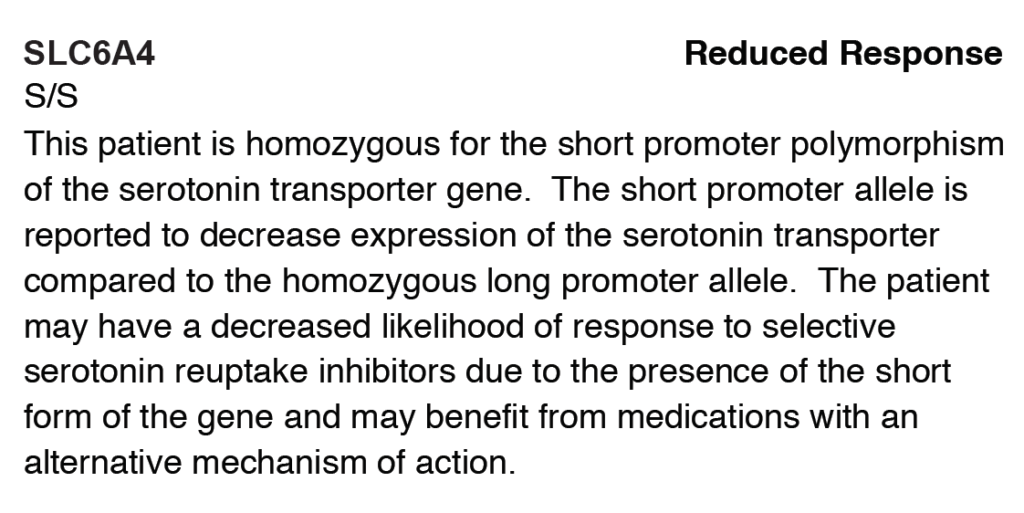I have heard many patients tell me: “My psychiatrist told me that the genetic testing result showed that I won’t respond to SSRI antidepressants.”
Below are segments from genetic testing reports from two different companies referring to this issue. Is it true that 5-HTTLPR polymorphisms can predict who will or will not respond to an SSRI?
The most recent meta-analysis on this topic as of May 2017 (Porcelli et al., 2010) found an association, in Caucasians with major depressive disorder, between having the L allele and:
— responding to an SSRI for major depression (odds ratio 1.6), and
— having remission with an SSRI (odds ratio 1.5).
So, the odds of response with the L allele are only a little bit better than those without an L allele.
In Caucasian patients with major depressive disorder taking an SSRI the remission rates were as follows:
L/L or L/S genotype: 52.8% (996/1885 patients)
S/S genotype: 45.6% (197/432 patients)
In Caucasian patients with major depressive disorder taking an SSRI the response rates were as follows:
L/L genotype: 61.6% (250/406 patients)
L/L or L/S genotype: 60.5% (579/957 patients)
S/S genotype: 48.8% (102/209 patients)
We should be clear that the S/S polymorphism only predicts a slightly lower probability of response to an SSRI. It does not mean, as the genetic testing report shown above seems to claim, that there is a “high risk of non-response,” or that an SSRI should not be used. Let’s help our patients to understand this as well.
But there are five factors that moderate this effect and in a subgroup of patients, the difference in response rates between the S/S and L/L genotypes becomes greater.
1. SSRIs
The association between 5-HTTLPR and response to antidepressants applies only to SSRIs.
2. Caucasians
The association between 5-HTTLPR polymorphisms and response to SSRIs applies only to Caucasians. In Asians, no significant association was found between 5-HTTLPR polymorphisms and response to SSRIs (Porcelli et al., 2010)
3. Females
Similarly, it has been suggested in a small study that the S/S genotype of 5-HTTLPR predicts a poorer response to treatment with serotonergic antidepressants in females (odds ratio 3.5) but not in males (Smits et al., 2008)
4. Age at onset of illness
The difference between the response rates with the L/L genotype compared to S carriers was greater with increasing age at onset of illness (Porcelli et al., 2010).
5. Current age
The difference between the response rates with the L/L genotype compared to S carriers was greater with increasing age at the time of the study (Porcelli et al., 2010).
So, for a Caucasian female who is older, whose illness started at a later age, and who is homozygous for low-expression alleles (S orLG), the response rate with an SSRI is likely to be lower than if she was homozygous for high-expression alleles (LA/LA ). However, we don’t know exactly how much the probabilities are.
If you are disappointed that 5-HTTLPR polymorphisms are not very useful in predicting response to SSRIs, let me note that these polymorphisms are much more useful in predicting side effects with SSRIs. That is discussed on another page (see Related Pages below).
Related Pages
Serotonin transporter linked polymorphic region (5-HTTLPR): Basic concepts
5-HTTLPR and adverse effects of antidepressants
5-HTTLPR and antidepressant-induced mania
Reviews and meta-analyses
Porcelli S, Fabbri C, Serretti A. Meta-analysis of serotonin transporter gene promoter polymorphism (5-HTTLPR) association with antidepressant efficacy. Eur Neuropsychopharmacol. 2012 Apr;22(4):239-58. PubMed PMID: 22137564.
Serretti A, Kato M, De Ronchi D, Kinoshita T. Meta-analysis of serotonin transporter gene promoter polymorphism (5-HTTLPR) association with selective serotonin reuptake inhibitor efficacy in depressed patients. Mol Psychiatry. 2007 Mar;12(3):247-57. Epub 2006 Dec 5. PubMed PMID: 17146470.
Primary studies
Smits KM, Smits LJ, Peeters FP, Schouten JS, Janssen RG, Smeets HJ, van Os J, Prins MH. The influence of 5-HTTLPR and STin2 polymorphisms in the serotonin transporter gene on treatment effect of selective serotonin reuptake inhibitors in depressive patients. Psychiatr Genet. 2008 Aug;18(4):184-90. doi: 10.1097/YPG.0b013e3283050aca. PubMed PMID: 18628680.
Copyright © 2017 to 2025, Simple and Practical Medical Education, LLC. All rights reserved. The content on this website may not be reproduced in any form without express written permission.
Disclaimer: The content on this website is provided as general education for medical professionals. It is not intended or recommended for patients or other lay persons or as a substitute for medical advice, diagnosis, or treatment. Patients must always consult a qualified health care professional regarding their diagnosis and treatment. Healthcare professionals should always check this website for the most recently updated information.


Dr Mago, in your blurb you did not put the actual differences between the response rates for the LL with the S or SS patients. Please do so, Thanks
Thanks, Dr. Freedman. That was a very good suggestion. I have now added that information to the article above.